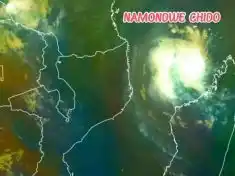
Cyclone Chido, which has been making headlines in recent days, has now entered the Mozambique Channel, a significant milestone in its path across the Indian Ocean.
The storm has travelled an impressive 1,100 kilometres from Malawi, moving from its previous location 1,500 kilometres away just the day before. As the storm continues to gain strength, experts and local authorities are closely monitoring its trajectory, as it brings a mix of concerns and preparations to the surrounding nations.
Cyclone Chido began its journey in the southern Indian Ocean, building strength as it moved toward the East African coast. Its initial path took it across Malawi, where it caused substantial concern and prompted early warnings.
As of the latest reports, Chido is now positioned in the Mozambique Channel—a body of water between the eastern coast of Mozambique and the western coast of Madagascar.
The storm’s movement across this 1,100-kilometer stretch has been relatively fast but powerful. Cyclones are typically characterized by their rotational strength, and Chido’s shift into the Mozambique Channel signals a new phase of its journey, where it could either intensify further or weaken as it continues to interact with the waters and air conditions around it.
The Mozambique Channel is known for being a key area for storm formation, and this is where Cyclone Chido could either gain or lose strength depending on various environmental factors, such as sea surface temperature and wind patterns.
In some cases, cyclones moving through this region have intensified, leading to greater impacts on the countries of Madagascar and Mozambique, which are directly in its path.
Cyclone Chido’s proximity to these two nations has raised alarm bells. As the storm moves through the Channel, it is expected to bring heavy rainfall, strong winds, and the potential for coastal flooding.
The nations of Madagascar and Mozambique are no strangers to cyclones, and their respective governments have already put measures in place to monitor the storm’s development and prepare for any necessary evacuations or disaster relief efforts.
With Cyclone Chido continuing its journey across the Indian Ocean, authorities have urged the public to stay vigilant and keep updated on the latest developments. While the cyclone has weakened somewhat since its initial stages, it remains a serious threat to the region.
In Malawi, the impacts of the cyclone have already been felt, with heavy rainfall and wind gusts reported in some areas, leaving citizens on edge about what may come next.
Meteorologists continue to study the behaviour of Cyclone Chido, watching for any signs that it may re-intensify as it continues to move toward the east. The cyclone’s progress is carefully tracked, with daily updates given to the public to ensure everyone is prepared for potential changes in its strength and direction.
As Cyclone Chido moves through the Mozambique Channel, experts are considering several potential scenarios for its future.
Some predict that the storm could make landfall along the coasts of Madagascar or Mozambique, bringing widespread devastation with strong winds, torrential rains, and possible flooding. Others anticipate that the storm may weaken as it interacts with cooler waters or the mountainous terrain of Madagascar.
Regardless of its eventual impact, Cyclone Chido has already shown how dynamic and unpredictable nature can be. As the storm moves eastward, it continues to shape the weather systems across the region, and its effects will likely be felt in several countries.
With Cyclone Chido now in the Mozambique Channel, both citizens and authorities must remain proactive in their preparations. Authorities are urging residents in coastal and at-risk areas to stay informed about the latest updates, take appropriate safety measures, and be ready to respond if the storm intensifies or takes a new course.
This event serves as a reminder of the power of nature and the importance of monitoring and preparedness. As Cyclone Chido continues its journey, the focus remains on staying alert and ensuring that communities can respond effectively to whatever challenges lie ahead.
The storm is far from over, and its ultimate impact will depend on how it interacts with the surrounding environment. For now, all eyes are on Cyclone Chido as it navigates the Mozambique Channel, a crucial point in its path that will determine how it affects the countries along the coast of Africa.






0 Comments